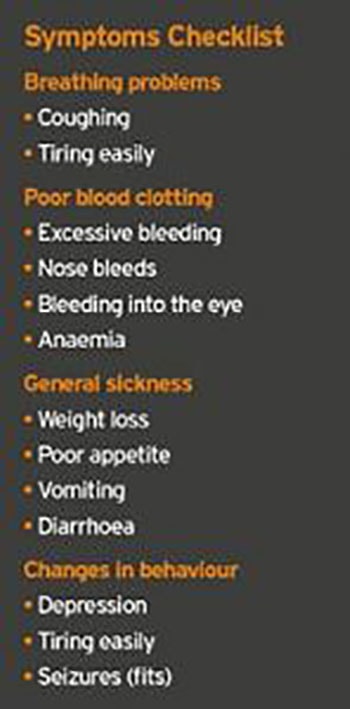You may have noticed a number of reports in the press recently about the potentially life threatening lungworm parasite Angiostrongylus vasorum.
Unlike intestinal worms, once inside your dog’s system, this parasite travels through their body eventually ending up in the heart. If the infection is left untreated, your dog’s health can rapidly deteriorate, often resulting in death.
The parasite is carried by slugs and snails, and the problem arises when dogs purposefully or accidentally eat these common garden visitors when they are rummaging through undergrowth, eating grass or drinking from outdoor water bowls.
Evidence from the Royal Veterinary College confirms the lungworm parasite has spread across the UK, from its traditional habitat in the south of England and Wales, now being widespread in Central England and also reaching northern regions and Scotland. It is thought that the spread of this parasite is due to a number of factors such as:
- The increase in fox numbers over the last 40 years (foxes are carriers of this parasite)
- Warmer, wetter winters see slugs and snails living longer and sometimes not dying off at all
- The increased movement of dogs in and out of areas of infection
Treatment can result in full recovery, but as this parasite can be fatal it is important to consider prevention. Preventative products are available and with regular use prevention is easy to achieve; always speak to your vet because not all worming products are effective against this particular parasite.
Lungworm infection – what to look out for:
Any dog can potentially become infected with Angiostrongylus vasorum if they happen to swallow a slug or snail carrying the larvae of the parasite.
Symptoms are many and varied but can include breathing difficulties, ranging from a lack of energy to coughing. Dogs may also show general signs of being unwell including weight loss, reduced appetite and vomiting.
 Persistent bleeding, even from minor cuts is also a sign to watch out for. However, the symptoms can be varied so if you are concerned about your dog’s health, you should seek veterinary advice immediately.
Persistent bleeding, even from minor cuts is also a sign to watch out for. However, the symptoms can be varied so if you are concerned about your dog’s health, you should seek veterinary advice immediately.
Bayer Animal Health has launched their Be Lungworm Aware campaign as part of it’s wider ‘It’s a Jungle Out There’ parasite protection initiative. You can help spread the word, and read the experiences of other vets and pet owners at facebook.com/jungleforpets or by following ‘JungleForPets’ on Twitter.
If you would like further advice on this parasite, as well as information on how to protect your pet and family from the risks posed by other parasites such as fleas, worms and mites, please see our website, give us a call or pop into your local branch.
Watch a video on the Lungworm lifecycle




